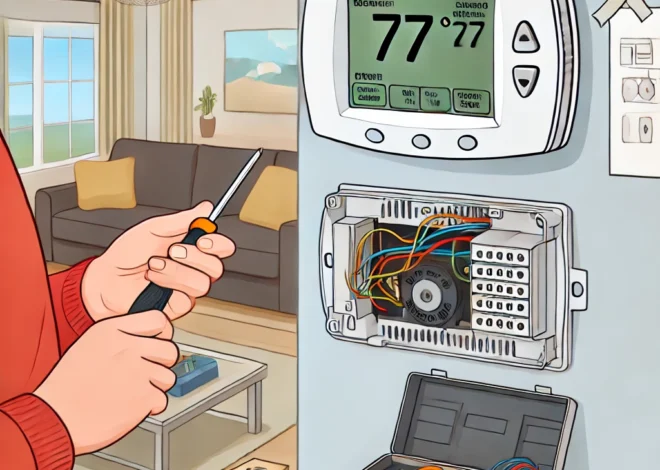
What is HVAC: Heating Ventilation and Air Conditioning
HVAC stands for Heating, Ventilation, and Air Conditioning is an essential system for creating comfortable and healthy indoor environments in both residential and commercial buildings. The system’s primary function is to control the temperature, humidity, and air quality in indoor spaces by regulating the flow of air, heat, and moisture.

Definition of HVAC
HVAC refers to a collection of mechanical systems that regulate temperature, humidity, and air quality in indoor spaces. It comprises heating, ventilation, and air conditioning components that work together to maintain a comfortable and healthy indoor environment.
Benefits of HVAC Systems
HVAC systems offer numerous benefits, including:
- Enhanced Comfort: HVAC systems ensure that indoor spaces remain comfortable throughout the year by regulating temperature and humidity.
- Improved Air Quality: HVAC systems filter out pollutants and other harmful substances, ensuring that indoor air quality remains high.
- Energy Efficiency: Modern HVAC systems are designed to operate efficiently, reducing energy consumption and utility bills.
- Increased Productivity: A comfortable indoor environment enhances productivity by reducing stress and improving concentration.
Overview of Components
HVAC systems have three primary components: heating, ventilation, and air conditioning.
Heating
The heating component of HVAC systems is responsible for regulating indoor temperature during cold weather. It does this by using various energy sources to generate heat.
Types of Energy Sources
The most common energy sources used for heating include natural gas, electricity, oil, propane, and geothermal energy.
Heating Process
The heating process uses energy sources to generate heat, which is distributed throughout the indoor space. Modern heating systems used advanced technology to regulate temperature, resulting in greater efficiency and reduced energy consumption.
Advantages of Modern Heating Systems
Modern heating systems offer several advantages, including:
- Energy Efficiency: Modern heating systems are designed to operate efficiently, reducing energy consumption and utility bills.
- Increased Comfort: Advanced technology allows for precise temperature control, ensuring a comfortable indoor environment.
- Reduced Environmental Impact: Modern heating systems produce fewer emissions, reducing their environmental impact.
Ventilation
The ventilation component of HVAC systems is responsible for maintaining indoor air quality by regulating the flow of air.
Role of Ventilation in Air Quality
Ventilation is critical for maintaining indoor air quality by removing pollutants, humidity, and other harmful substances.
Types of Mechanical Ventilation
There are two types of mechanical ventilation systems: balanced and unbalanced. Balanced systems use two fans to maintain a balanced airflow, while unbalanced systems use a single fan to remove indoor air and bring in outdoor air.
Benefits of Advanced Ventilation Systems
Advanced ventilation systems offer several benefits, including:
- Improved Indoor Air Quality: Advanced ventilation systems filter out pollutants and other harmful substances, ensuring that indoor air quality remains high.
- Energy Efficiency: Advanced ventilation systems are designed to operate efficiently, reducing energy consumption and utility bills.
- Reduced Environmental Impact: Advanced ventilation systems produce fewer emissions, reducing their environmental impact.
Types of Air Conditioners
There are several types of air conditioners, including central air conditioning, ductless air conditioning, and window air conditioning.
Cooling Process
The cooling process involves removing heat and humidity from indoor spaces and replacing it with cool, dry air.
Maintenance
Maintaining HVAC systems is critical for ensuring their efficient operation and longevity.
Benefits of Regular Maintenance
Regular maintenance offers several benefits, including:
- Improved Performance: Regular maintenance ensures that HVAC systems operate at peak performance, reducing the likelihood of breakdowns and the need for costly repairs.
- Increased Energy Efficiency: Regular maintenance helps HVAC systems operate efficiently, reducing energy consumption and utility bills.
- Extended Lifespan: Regular maintenance can extend the lifespan of HVAC systems, reducing the need for costly replacements.
Types of Maintenance Tasks
Maintenance tasks for HVAC systems include:
- Changing air filters: This helps improve indoor air quality and ensures that the system operates efficiently.
- Cleaning ducts and vents: This helps improve indoor air quality and ensures that air can flow freely through the system.
- Checking refrigerant levels: This ensures that the air conditioning system can cool indoor spaces effectively.
Tips for Improving Energy Efficiency
To improve energy efficiency, consider the following tips:
- Install a programmable thermostat to regulate temperature and reduce energy consumption.
- Upgrade to energy-efficient HVAC components, such as high-efficiency furnaces and air conditioners.
- Seal air leaks in ducts and around windows and doors to prevent heat loss and improve energy efficiency.
Smart Technologies
Smart technologies are increasingly being used to improve the efficiency and sustainability of HVAC systems.
Overview of Smart HVAC Systems
Smart HVAC systems use advanced sensors, algorithms, and machine learning to optimize the operation of heating, ventilation, and air conditioning components.
Benefits of Energy-Saving Technologies
Energy-saving technologies offer several benefits, including:
- Improved Energy Efficiency: Smart technologies help HVAC systems operate efficiently, reducing energy consumption and utility bills.
- Enhanced Comfort: Smart technologies allow for precise temperature control, ensuring a comfortable indoor environment.
- Reduced Environmental Impact: Energy-saving technologies produce fewer emissions, reducing their environmental impact.
Tips for Sustainable HVAC Management
To manage HVAC systems sustainably, consider the following tips:
- Conduct regular maintenance to ensure efficient operation and extend the lifespan of HVAC components.
- Upgrade to energy-efficient HVAC components and consider installing smart technologies to optimize system performance.
- Monitor energy consumption and track performance metrics to identify areas for improvement.
Conclusion
HVAC systems are critical for creating comfortable and healthy indoor environments in both residential and commercial buildings. The system’s components, including heating, ventilation, and air conditioning, work together to regulate temperature, humidity, and air quality. Modern HVAC systems offer numerous benefits, including enhanced comfort, improved air quality, energy efficiency, and increased productivity. Regular maintenance, energy-saving technologies, and sustainable HVAC management practices can further improve the efficiency and sustainability of HVAC systems.



